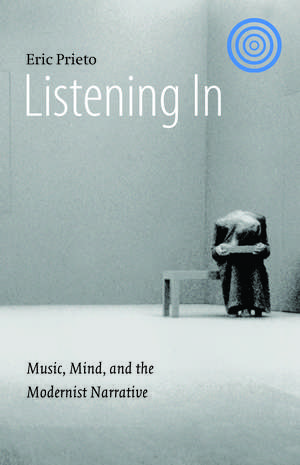Listening In: Music, Mind, and the Modernist Narrative: Stages
Autor Eric Prietoen Limba Engleză Paperback – 31 aug 2007
What can music teach a novelist, autobiographer, or playwright about the art of telling stories? The musical play of forms and sounds seems initially to have little to do with the representational function of the traditional narrative genres. Yet throughout the modernist era, music has been invoked as a model for narrative in its specifically mimetic dimension. Although modernist writers may conceive of musical communication in widely divergent ways, they have tended to agree on one crucial point: that music can help transform narrative into a medium better adapted to the representation of consciousness.
Eric Prieto studies the twentieth-century evolution of this use of music, with particular emphasis on the postwar Parisian avant-garde. For such writers as Samuel Beckett, Michel Leiris, and Robert Pinget, music provides a number of guiding metaphors for the inwardly directed mode of mimesis that Prieto calls "listening in," where the object of representation is not the outside world but the subtly modulating relations between consciousness and world.
This kind of semiotic boundary crossing between music and literature is inherently metaphorical, but, as Prieto's analyses of Beckett, Leiris, and Pinget show, these interart analogies provide valuable clues for bringing to light the unspoken assumptions, obscurely understood principles, and extra-literary aspirations that gave such urgency to the modernist quest to better represent the mind in action.
This kind of semiotic boundary crossing between music and literature is inherently metaphorical, but, as Prieto's analyses of Beckett, Leiris, and Pinget show, these interart analogies provide valuable clues for bringing to light the unspoken assumptions, obscurely understood principles, and extra-literary aspirations that gave such urgency to the modernist quest to better represent the mind in action.
Din seria Stages
-
 Preț: 290.14 lei
Preț: 290.14 lei -
 Preț: 133.63 lei
Preț: 133.63 lei -
 Preț: 355.58 lei
Preț: 355.58 lei -
 Preț: 219.43 lei
Preț: 219.43 lei - 15%
 Preț: 357.95 lei
Preț: 357.95 lei -
 Preț: 137.07 lei
Preț: 137.07 lei -
 Preț: 288.03 lei
Preț: 288.03 lei -
 Preț: 303.21 lei
Preț: 303.21 lei -
 Preț: 392.44 lei
Preț: 392.44 lei -
 Preț: 393.20 lei
Preț: 393.20 lei -
 Preț: 250.14 lei
Preț: 250.14 lei -
 Preț: 180.44 lei
Preț: 180.44 lei -
 Preț: 211.28 lei
Preț: 211.28 lei -
 Preț: 215.79 lei
Preț: 215.79 lei -
 Preț: 429.67 lei
Preț: 429.67 lei -
 Preț: 210.05 lei
Preț: 210.05 lei - 15%
 Preț: 455.95 lei
Preț: 455.95 lei -
 Preț: 186.27 lei
Preț: 186.27 lei -
 Preț: 388.82 lei
Preț: 388.82 lei - 27%
 Preț: 127.45 lei
Preț: 127.45 lei -
 Preț: 433.93 lei
Preț: 433.93 lei
Preț: 218.34 lei
Nou
Puncte Express: 328
Preț estimativ în valută:
41.78€ • 43.46$ • 34.50£
41.78€ • 43.46$ • 34.50£
Carte tipărită la comandă
Livrare economică 15-29 aprilie
Preluare comenzi: 021 569.72.76
Specificații
ISBN-13: 9780803222359
ISBN-10: 0803222351
Pagini: 342
Ilustrații: 6 figures
Dimensiuni: 140 x 216 x 15 mm
Greutate: 0.46 kg
Editura: Nebraska Paperback
Colecția University of Nebraska Press
Seria Stages
Locul publicării:United States
ISBN-10: 0803222351
Pagini: 342
Ilustrații: 6 figures
Dimensiuni: 140 x 216 x 15 mm
Greutate: 0.46 kg
Editura: Nebraska Paperback
Colecția University of Nebraska Press
Seria Stages
Locul publicării:United States
Notă biografică
Eric Prieto is an assistant professor of French at the University of California, Santa Barbara.
Recenzii
"Carefully reasoned. . . . Difficult but rewarding. Highly recommended."—Choice
“A well-researched book likely to appeal to both scholars and students. Prieto’s style is clear and meticulous, and every key notion is explained…. [It] delivers a pertinent study of modernist literature, as well as a landmark for research on music in literature, laying a sound groundwork for analysis of other ‘musical’ postmodernist narratives.”—Jean-Luis Pautrot, Comparative Literature
“This kind of semiotic boundary crossing between music and literature is inherently metaphorical, but, as Prieto’s analyses of Beckett, Leiris, and Pinget show, these interart analogies provide valuable clues for bringing to light the unspoken assumptions, obscurely understood principles, and extra-literary aspirations that gave such urgency to the modernist quest to better represent the mind in action.”—Fabula













